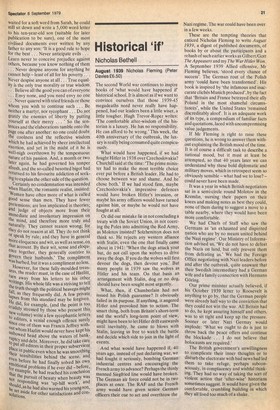Historical 'if'
Nicholas Bethell
August 1939 Nicholas Fleming (Peter Davies £6.50) The second World war continues to inspire books of 'what would have happened if' historical school. It is almost as if we want to convince ourselves that those 1939-45 megadeaths need never really have happened, had our leaders been a little wiser, a little tougher. Hugh Trevor-Roper writes: 'The comfortable after-wisdom of the historian is a luxury. He has no responsibility. He can afford to be wrong.' This week, the 40th anniversary of the outbreak, the luxury is really being consumed quite conspicuously.
What would have happened, if we had fought Hitler in 1938 over Czechoslovakia?
Churchill said at the time: 'The prime minis ter had to make the most terrible choice ever put before a British leader. He had to choose between war and shame. And he chose both.' If we had stood firm, maybe Czechoslovakia's impressive defences would have broken Hitler's invasion, or maybe his army officers would have turned against him, or maybe he would not have fought at all.
Or did our mistake lie in not concluding a treaty with the Soviet Union, in not coerc ing the Poles into admitting the Red Army, as Molotov insisted? Solzhenitsyn does not think so. He rejects any western alliance with Stalin, even the one that finally came about in 1941: 'When the dogs attack your hut, do not call upon the wolves to drive away the dogs. If you do the wolves will first devour the dogs, then devour you.' But many people in 1939 saw the wolves as Hitler and his team. On that basis an arrangement with Stalin, dog or no dog, should have been sought most urgently.
What, then, if Chamberlain had not issued his Polish guarantee? It obviously failed in its purpose. If anything, it angered Hitler and provoked him to action. The smart thing, both from Britain's short-term and the world's long-term point of view, might have been to let Hitler drift eastwards until inevitably, he came to blows with Stalin, leaving us free to watch the battle and decide which side to join in the light of events.
And what would have happened if, 40 years ago, instead of just declaring war, we had fought it seriously, bombing German industrial centres and encouraging the French army to advance? Perhaps the thinly manned Siegfried line would have broken. The German air force could not be in two places at once. The RAF and the French army would have given senior German officers their cue to act and overthrow the Nazi regime. The war could have been over in a few weeks.
These are the tempting theories that enticed Nicholas Fleming to write August 1939, a digest of published documents, of books by or about the participants and a rehash of such earlier works as Gilbert/Gott The Appeasers and my The War Hitler Won. A September 1939 Allied offensive, Mr Fleming believes, 'stood every chance of success'. The German rout of the Polish army 'could have been transformed'. His book is inspired by 'the infamous and inaccurate cliches Munich produced', by the fact that 'Britain and France betrayed their ally Poland in the most shameful circumstances', while the United States 'remained discreditably aloof'. It is an adequate work of its type, a compendium of familiar facts and quotations, laced with uncompromising value judgements.
If Mr Fleming is right to raise these questions, he is wrong to answer them without explaining the British mood of the time. It is of course a difficult task to describe a national mood, but it must at least be attempted, so that 40 years later we can understand why these bold diplomatic and military moves, which in retrospect seem so obviously sensible — what had we to lose? — could never have been made.
It was a year in which British negotiators sat in a semi-circle round Molotov in the Kremlin, nursing their papers on their knees and making notes as best they could, none of them daring to suggest a move to a table nearby, where they would have been more comfortable.
We had Chiefs of Staff who saw the Germans as 'an exhausted and dispirited nation who are by no means united behind the Nazi regime'. Our Ministry of Information advised us, 'We do not have to defeat the Nazis on land, but only prevent them from defeating us.' We had the Foreign Office negotiating with Nazi leaders before and after the outbreak, quite unaware that their Swedish intermediary had a German wife and a family connection with Hermann Goring.
Our prime minister actually believed, if his October 1939 letter to Roosevelt is anything to go by, that the German people were already half way to the conviction that they could not win the war. All Britain had to do, he kept assuring himself and others, was to sit tight and keep up the pressure. Sooner or later Nazi Germay would implode: 'What we ought to do is just to throw back the peace offers and continue the blockade . . . I do not believe that holocausts are required.'
The British government's unwillingness to complicate their inner thoughts or to disturb the electorate with bad news had led them to take refuge, perhaps subconsciously, in complacency and wishful thinking. They had no way of taking the sort of violent action that 'after-wise' historians sometimes suggest. It would have given the comfortable, crumbling building in which they all lived too much of a shake,


































 Previous page
Previous page